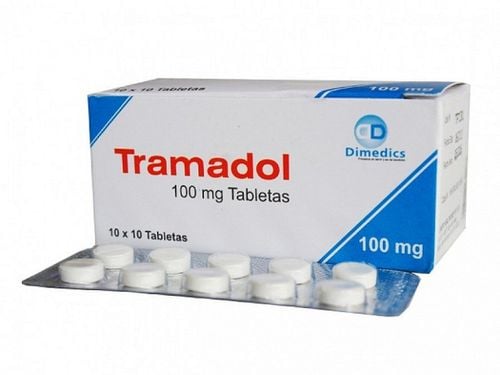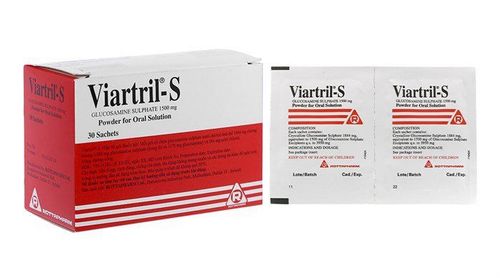Arthrotec is usually prepared in tablet form, with the main ingredients including diclofenac and misoprostol. The drug is used to reduce pain, swelling and stiffness in patients with arthritis.
1. What is the effect of Arthrotec?
Arthrotec is a slow-release tablet containing 50mg diclofenac sodium and 200mcg misoprostol (Arthrotec 50 mg) or 75mg diclofenac sodium and 200mcg misoprostol (Arthrotec 75mg). The ingredient Diclofenac in the drug is a non-steroidal anti-inflammatory drug (NSAID) that works by reducing substances that cause pain and inflammation in the body. The ingredient Misoprostol has the effect of reducing acid in the stomach, replacing the stomach protection substances that are impaired by NSAIDs. Misoprostol can protect the lining of the stomach, intestines and esophagus when using Diclofenac.
Indications for using Arthrotec: Treatment of osteoarthritis and rheumatoid arthritis in patients at high risk of gastrointestinal ulcers.
Contraindications for using Arthrotec:
- People who are allergic to diclofenac or misoprostol in the drug;
- Patients with stomach or intestinal bleeding;
- Pregnant women;
- People with a history of asthma attacks or severe allergic reactions after using aspirin or NSAIDs.
2. How to use and dosage of Arthrotec
2.1 How to use
Take Arthrotec as directed by your doctor. Patients can take the medicine with food or milk to reduce stomach pain. Patients should swallow the whole tablet with a glass of water (240ml), do not crush, chew or break the tablet. Patients should not lie down immediately after taking the medicine but should wait at least 10 minutes.
It is best for patients to take Arthrotec at a fixed time each day. Usually, after about 2 weeks of taking the medicine, the symptoms of the disease will show signs of improvement. Patients should also not share Arthrotec with anyone else, even if they have similar symptoms to you. If using Arthrotec for a long time, patients may need to have regular health check-ups.
2.2 Dosage
Dosage for adults with osteoarthritis:
Usual dose: 1 tablet of Arthrotec 50mg (diclofenac 50mg-misoprostol 200mcg)/time x 3 times/day;
Maximum dose: Diclofenac 150mg/day; misoprostol 200mcg/dose and 800 mcg/day
Dosage for adults with rheumatoid arthritis:
Usual dose: 1 tablet of Arthrotec 50mg (diclofenac 50mg-misoprostol 200mcg)/time x 3 - 4 times/day;
Maximum dose: Diclofenac 225mg/day; misoprostol 200mcg/dose and 800 mcg/day
Missed dose: If you miss a dose of Arthrotec, you should take the medicine as soon as possible. If it is almost time for your next dose, skip the missed dose and take your next dose as scheduled.
Overdose: Call your doctor immediately if you overdose on Arthrotec for appropriate advice.
3. Side effects of Arthrotec
When using Arthrotec, patients may experience some side effects such as:
- Common side effects: Abnormal vaginal bleeding, nausea, vomiting, heartburn, bloating, indigestion, stomach pain, constipation, diarrhea, dizziness;
- Serious side effects: Allergic reaction (sneezing, runny nose, stuffy nose, rash, swelling of the face or throat, difficulty breathing, wheezing), severe skin reaction (fever, burning eyes, sore throat, red or purple rash, skin pain, peeling, blistering), heart attack or stroke (chest pain spreading to the jaw or shoulder, sudden numbness or weakness on one side of the body, trouble breathing, slurred speech), signs of stomach bleeding (bloody or tarry stools, coughing up blood or vomit that looks like coffee grounds), liver problems (upper right stomach pain, loss of appetite, tiredness, itchy skin, clay-colored stools, dark urine, jaundice, yellowing of the skin and eyes), kidney problems (little or no urination, swelling of the feet or ankles, shortness of breath, tiredness), anemia (pale skin, tiredness, dizziness, shortness of breath, cold hands and feet),... When experiencing side effects of Arthrotec, patients should immediately notify their doctor for Get appropriate advice and immediate action.
4. Caution when using Arthrotec
Before and while using Arthrotec, patients should note:
- Do not use Arthrotec if you are pregnant, because the ingredient Misoprostol in the drug can cause birth defects, miscarriage, premature labor or uterine rupture. Patients must confirm a negative pregnancy test within 2 weeks before starting to use Arthrotec. At the same time, you should use contraception while taking this drug;
- Do not use Arthrotec if you have stomach or intestinal bleeding;
- The ingredient Diclofenac in Arthrotec can increase the risk of heart attack or stroke, leading to death. Do not use Arthrotec immediately before or after coronary artery bypass graft surgery. In addition, Diclofenac can also cause stomach or intestinal bleeding, even leading to death;
- To ensure safety when using Arthrotec, you should inform your doctor if you have the following problems: Heart disease, high blood pressure, high cholesterol, diabetes, smoking, heart attack, stroke, blood clots, stomach ulcers or bleeding, asthma, porphyria, liver or kidney disease, fluid retention;
- Be careful, consult your doctor before using Arthrotec in breastfeeding mothers;
- When using Arthrotec, patients should avoid exposure to sunlight, because the drug can make you more susceptible to sunburn. You should wear protective clothing and use sunscreen with a minimum SPF of 30 or higher when outdoors;
- Patients should avoid using antacids, unless prescribed by a doctor. The reason is because some antacids can make it difficult for the body to absorb diclofenac and misoprostol;
- Avoid drinking alcohol while taking Arthrotec, as alcohol can increase the risk of stomach bleeding due to the Diclofenac ingredient in the drug;
- Do not drive or operate machinery while taking Arthrotec because the patient may experience some side effects such as fatigue, dizziness, etc.;
- Consult your doctor before using any medications to treat pain, fever, swelling or colds, flu, etc. Because other drugs such as aspirin, ibuprofen, ketoprofen or naproxen, etc. may contain ingredients similar to diclofenac.
5. Arthrotec drug interactions
Some drugs that may interact with Arthrotec include:
- Antidepressants containing NSAIDs when used in combination with Arthrotec can make the patient more susceptible to bruising or bleeding;
- Drugs that interact with Arthrotec include: Cyclosporine, lithium, methotrexate, diuretics, diabetes medications, heart or blood pressure medications, anticoagulants (warfarin, coumadin, jantoven), other forms of diclofenac (Cambia, Flector, Cataflam, Voltaren, Zipsor, Zorvolex), other NSAIDs (aspirin, ibuprofen, naproxen, celecoxib, indomethacin, meloxicam, ...), steroids (prednisone, dexamethasone, ...).
Arthrotec is a pain reliever and joint stiffness drug that is commonly used today because it is effective in people with arthritis. However, during the course of taking the medication, patients should pay attention to some side effects of the medication and strictly follow the doctor's instructions to ensure the best treatment effect.
To arrange an appointment, please call HOTLINE or make your reservation directly HERE. You may also download the MyVinmec app to schedule appointments faster and manage your reservations more conveniently.













